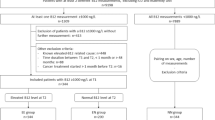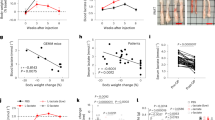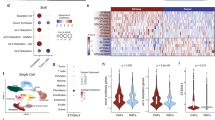Abstract
Tumor-associated macrophages mediate the link between inflammation and cancer progression. Here, we showed that macrophage-derived soluble factors induce canonical Wnt signaling in colon cancer cells and promote their growth. Tumor cells induced the release of interleukin (IL)-1β from macrophages, which induced phosphorylation of GSK3β, stabilized β-catenin, enhanced T-cell factor (TCF)-dependent gene activation and induced the expression of Wnt target genes in tumor cells. Neutralization experiments using anti-IL-1β-specific antibodies, or silencing of IL-1β in THP1 macrophages, showed that IL-1β was required for macrophages to induce Wnt signaling and to support the growth of tumor cells. Constitutive activation of signal transducer and activator of transcription (STAT)1 in THP1 macrophages was essential for the induction of IL-1β and thus for the activation of β-catenin signaling in tumor cells. Vitamin D3, an effective chemopreventive agent, interrupted this crosstalk by blocking the constitutive activation of STAT1 and the production of IL-1β in macrophages, and therefore—in a vitamin D receptor-dependent manner—inhibited the ability of macrophages to activate Wnt signaling in colon carcinoma cells. Our data therefore established that vitamin D3 exerts its chemopreventive activity by interrupting a crosstalk between tumor epithelial cells and the tumor microenvironment.
This is a preview of subscription content, access via your institution
Access options
Subscribe to this journal
Receive 50 print issues and online access
$259.00 per year
only $5.18 per issue
Buy this article
- Purchase on Springer Link
- Instant access to full article PDF
Prices may be subject to local taxes which are calculated during checkout






Similar content being viewed by others
References
Albini A, Sporn MB . (2007). The tumour microenvironment as a target for chemoprevention. Nat Rev Cancer 7: 139–147.
Allavena P, Sica A, Solinas G, Porta C, Mantovani A . (2008). The inflammatory micro-environment in tumor progression: the role of tumor-associated macrophages. Crit Rev Oncol Hematol 66: 1–9.
Bissell MJ, Labarge MA . (2005). Context, tissue plasticity, and cancer: are tumor stem cells also regulated by the microenvironment? Cancer Cell 7: 17–23.
Biswas SK, Gangi L, Paul S, Schioppa T, Saccani A, Sironi M et al. (2006). A distinct and unique transcriptional program expressed by tumor-associated macrophages (defective NF-kappaB and enhanced IRF-3/STAT1 activation). Blood 107: 2112–2122.
Brabletz T, Jung A, Hermann K, Gunther K, Hohenberger W, Kirchner T . (1998). Nuclear overexpression of the oncoprotein beta-catenin in colorectal cancer is localized predominantly at the invasion front. Pathol Res Pract 194: 701–704.
Brabletz T, Jung A, Reu S, Porzner M, Hlubek F, Kunz-Schughart LA et al. (2001). Variable beta-catenin expression in colorectal cancers indicates tumor progression driven by the tumor environment. Proc Natl Acad Sci USA 98: 10356–10361.
Cross DA, Alessi DR, Cohen P, Andjelkovich M, Hemmings BA . (1995). Inhibition of glycogen synthase kinase-3 by insulin mediated by protein kinase B. Nature 378: 785–789.
Etoh T, Shibuta K, Barnard GF, Kitano S, Mori M . (2000). Angiogenin expression in human colorectal cancer: the role of focal macrophage infiltration. Clin Cancer Res 6: 3545–3551.
Fichera A, Little N, Dougherty U, Mustafi R, Cerda S, Li YC et al. (2007). A vitamin D analogue inhibits colonic carcinogenesis in the AOM/DSS model. J Surg Res 142: 239–245.
Forssell J, Oberg A, Henriksson ML, Stenling R, Jung A, Palmqvist R . (2007). High macrophage infiltration along the tumor front correlates with improved survival in colon cancer. Clin Cancer Res 13: 1472–1479.
Garland CF, Comstock GW, Garland FC, Helsing KJ, Shaw EK, Gorham ED . (1989). Serum 25-hydroxyvitamin D and colon cancer: eight-year prospective study. Lancet 2: 1176–1178.
Gounaris E, Erdman SE, Restaino C, Gurish MF, Friend DS, Gounari F et al. (2007). Mast cells are an essential hematopoietic component for polyp development. Proc Natl Acad Sci USA 104: 19977–19982.
Gunter MJ, Canzian F, Landi S, Chanock SJ, Sinha R, Rothman N . (2006). Inflammation-related gene polymorphisms and colorectal adenoma. Cancer Epidemiol Biomarkers Prev 15: 1126–1131.
Hagemann T, Lawrence T, McNeish I, Charles KA, Kulbe H, Thompson RG et al. (2008). ‘Re-educating’ tumor-associated macrophages by targeting NF-kappaB. J Exp Med 205: 1261–1268.
Kampman E, Slattery ML, Caan B, Potter JD . (2000). Calcium, vitamin D, sunshine exposure, dairy products and colon cancer risk (United States). Cancer Causes Control 11: 459–466.
Kim BG, Li C, Qiao W, Mamura M, Kasprzak B, Anver M et al. (2006). Smad4 signalling in T cells is required for suppression of gastrointestinal cancer. Nature 441: 1015–1019.
Klampfer L, Huang J, Sasazuki T, Shirasawa S, Augenlicht L . (2003). Inhibition of interferon gamma signaling by the short chain fatty acid butyrate. Mol Cancer Res 1: 855–862.
Klampfer L, Huang J, Sasazuki T, Shirasawa S, Augenlicht L . (2004). Oncogenic Ras promotes butyrate-induced apoptosis through inhibition of gelsolin expression. J Biol Chem 279: 36680–36688.
Klampfer L, Huang J, Shirasawa S, Sasazuki T, Augenlicht L . (2007). Histone deacetylase inhibitors induce cell death selectively in cells that harbor activated kRasV12: the role of signal transducers and activators of transcription 1 and p21. Cancer Res 67: 8477–8485.
Klampfer L, Swaby LA, Huang J, Sasazuki T, Shirasawa S, Augenlicht L . (2005). Oncogenic Ras increases sensitivity of colon cancer cells to 5-FU-induced apoptosis. Oncogene 24: 3932–3941.
Kumagai T, O'Kelly J, Said JW, Koeffler HP . (2003). Vitamin D2 analog 19-nor-1,25-dihydroxyvitamin D2: antitumor activity against leukemia, myeloma, and colon cancer cells. J Natl Cancer Inst 95: 896–905.
Kusmartsev S, Gabrilovich DI . (2005). STAT1 signaling regulates tumor-associated macrophage-mediated T cell deletion. J Immunol 174: 4880–4891.
Lamprecht SA, Lipkin M . (2003). Chemoprevention of colon cancer by calcium, vitamin D and folate: molecular mechanisms. Nat Rev Cancer 3: 601–614.
Lee C, Lim HK, Sakong J, Lee YS, Kim JR, Baek SH . (2006). Janus kinase-signal transducer and activator of transcription mediates phosphatidic acid-induced interleukin (IL)-1beta and IL-6 production. Mol Pharmacol 69: 1041–1047.
Lin WW, Karin M . (2007). A cytokine-mediated link between innate immunity, inflammation, and cancer. J Clin Invest 117: 1175–1183.
Lipkin M, Lamprecht SA . (2006). Mechanisms of action of vitamin D: recent findings and new questions. J Med Food 9: 135–137.
Maeda S, Hsu LC, Liu H, Bankston LA, Iimura M, Kagnoff MF et al. (2005). Nod2 mutation in Crohn's disease potentiates NF-kappaB activity and IL-1beta processing. Science 307: 734–738.
Moon RT, Bowerman B, Boutros M, Perrimon N . (2002). The promise and perils of Wnt signaling through beta-catenin. Science 296: 1644–1646.
Newmark HL, Lipkin M . (1992). Calcium, vitamin D, and colon cancer. Cancer Res 52: 2067s–2070s.
Oguma K, Oshima H, Aoki M, Uchio R, Naka K, Nakamura S et al. (2008). Activated macrophages promote Wnt signalling through tumour necrosis factor-alpha in gastric tumour cells. EMBO J 27: 1671–1681.
Oosterling SJ, van der Bij GJ, Meijer GA, Tuk CW, van Garderen E, van Rooijen N et al. (2005). Macrophages direct tumour histology and clinical outcome in a colon cancer model. J Pathol 207: 147–155.
Oyama T, Yamada Y, Hata K, Tomita H, Hirata A, Sheng H et al. (2008). Further upregulation of \{beta\}-catenin/Tcf transcription is involved in the de. Carcinogenesis 29: 666–672.
Pai R, Dunlap D, Qing J, Mohtashemi I, Hotzel K, French DM . (2008). Inhibition of fibroblast growth factor 19 reduces tumor growth by modulating beta-catenin signaling. Cancer Res 68: 5086–5095.
Palmer HG, Gonzalez-Sancho JM, Espada J, Berciano MT, Puig I, Baulida J et al. (2001). Vitamin D(3) promotes the differentiation of colon carcinoma cells by the induction of E-cadherin and the inhibition of beta-catenin signaling. J Cell Biol 154: 369–387.
Palmer HG, Larriba MJ, Garcia JM, Ordonez-Moran P, Pena C, Peiro S et al. (2004). The transcription factor SNAIL represses vitamin D receptor expression and responsiveness in human colon cancer. Nat Med 10: 917–919.
Pendas-Franco N, Aguilera O, Pereira F, Gonzalez-Sancho JM, Munoz A . (2008). Vitamin D and Wnt/beta-catenin pathway in colon cancer: role and regulation of DICKKOPF genes. Anticancer Res 28: 2613–2623.
Pollard JW . (2004). Tumour-educated macrophages promote tumour progression and metastasis. Nat Rev Cancer 4: 71–78.
Pull SL, Doherty JM, Mills JC, Gordon JI, Stappenbeck TS . (2005). Activated macrophages are an adaptive element of the colonic epithelial progenitor niche necessary for regenerative responses to injury. Proc Natl Acad Sci USA 102: 99–104.
Qiu W, Hu M, Sridhar A, Opeskin K, Fox S, Shipitsin M et al. (2008). No evidence of clonal somatic genetic alterations in cancer-associated fibroblasts from human breast and ovarian carcinomas. Nat Genet 40: 650–655.
Rasola A, Fassetta M, De Bacco F, D'Alessandro L, Gramaglia D, Di Renzo MF et al. (2007). A positive feedback loop between hepatocyte growth factor receptor and beta-catenin sustains colorectal cancer cell invasive growth. Oncogene 26: 1078–1087.
Robsahm TE, Tretli S, Dahlback A, Moan J . (2004). Vitamin D3 from sunlight may improve the prognosis of breast-, colon- and prostate cancer (Norway). Cancer Causes Control 15: 149–158.
Shah S, Hecht A, Pestell R, Byers SW . (2003). Trans-repression of beta-catenin activity by nuclear receptors. J Biol Chem 278: 48137–48145.
Shah S, Islam MN, Dakshanamurthy S, Rizvi I, Rao M, Herrell R et al. (2006). The molecular basis of vitamin D receptor and beta-catenin crossregulation. Mol Cell 21: 799–809.
Shirasawa S, Furuse M, Yokoyama N, Sasazuki T . (1993). Altered growth of human colon cancer cell lines disrupted at activated Ki-ras. Science 260: 85–88.
Siziopikou KP, Harris JE, Casey L, Nawas Y, Braun DP . (1991). Impaired tumoricidal function of alveolar macrophages from patients with non-small cell lung cancer. Cancer 68: 1035–1044.
Suzuki H, Watkins DN, Jair KW, Schuebel KE, Markowitz SD, Chen WD et al. (2004). Epigenetic inactivation of SFRP genes allows constitutive WNT signaling in colorectal cancer. Nat Genet 36: 417–422.
Taketo MM . (2004). Shutting down Wnt signal-activated cancer. Nat Genet 36: 320–322.
Tsuchiya S, Kobayashi Y, Goto Y, Okumura H, Nakae S, Konno T et al. (1982). Induction of maturation in cultured human monocytic leukemia cells by a phorbol diester. Cancer Res 42: 1530–1536.
Tsukada J, Waterman WR, Koyama Y, Webb AC, Auron PE . (1996). A novel STAT-like factor mediates lipopolysaccharide, interleukin 1 (IL-1), and IL-6 signaling and recognizes a gamma interferon activation site-like element in the IL1B gene. Mol Cell Biol 16: 2183–2194.
Tu S, Bhagat G, Cui G, Takaishi S, Kurt-Jones EA, Rickman B et al. (2008). Overexpression of interleukin-1beta induces gastric inflammation and cancer and mobilizes myeloid-derived suppressor cells in mice. Cancer Cell 14: 408–419.
Yang L, Lin C, Liu ZR . (2006). P68 RNA helicase mediates PDGF-induced epithelial mesenchymal transition by displacing Axin from beta-catenin. Cell 127: 139–155.
Acknowledgements
We thank Dr Paolo Norio for reading the paper. This work was supported by CA 111361 (to LK), U54 CA 100926 (to LA) and P30-13330 from NCI.
Author information
Authors and Affiliations
Corresponding author
Additional information
Supplementary Information accompanies the paper on the Oncogene website (http://www.nature.com/onc)
Supplementary information
Rights and permissions
About this article
Cite this article
Kaler, P., Augenlicht, L. & Klampfer, L. Macrophage-derived IL-1β stimulates Wnt signaling and growth of colon cancer cells: a crosstalk interrupted by vitamin D3. Oncogene 28, 3892–3902 (2009). https://doi.org/10.1038/onc.2009.247
Received:
Revised:
Accepted:
Published:
Issue Date:
DOI: https://doi.org/10.1038/onc.2009.247
Keywords
This article is cited by
-
Random survival forests identify pathways with polymorphisms predictive of survival in KRAS mutant and KRAS wild-type metastatic colorectal cancer patients
Scientific Reports (2021)
-
A flavonoid-rich extract from bergamot juice prevents carcinogenesis in a genetic model of colorectal cancer, the Pirc rat (F344/NTac-Apcam1137)
European Journal of Nutrition (2020)
-
Growth inhibition and apoptosis in colorectal cancer cells induced by Vitamin D-Nanoemulsion (NVD): involvement of Wnt/β-catenin and other signal transduction pathways
Cell & Bioscience (2019)
-
Vitamin D and Wnt3A have additive and partially overlapping modulatory effects on gene expression and phenotype in human colon fibroblasts
Scientific Reports (2019)
-
Spliceosome protein Eftud2 promotes colitis-associated tumorigenesis by modulating inflammatory response of macrophage
Mucosal Immunology (2019)



